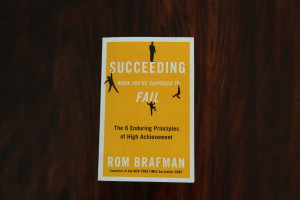Succeeding When You’re Supposed to Fail: The 6 Enduring Principles of High Achievement by Rom Brafman
What I learned:
The willingness to take personal responsibility for what is happening to us is the underpinning of success. Think of life as a stage: you are on it going through the motions, but whether the spotlight is on you or on the audience out there is up to you. Successful people believe that the spotlight is on them: that is, they believe they have agency in their own lives and the decisions they make have an impact; whereas the less successful do not believe that spotlight shines on them, and therefore what happens to them is a result of external events and the decision of others. They do not control their lives and feel powerless to move forward. Believing the spotlight shines on you gives you the control necessary in directing your life.
We are all too eager to accept credit when things go well in our lives, but are all too quick to delegate responsibility to others when things do not go well. Think of your tale of woe (whatever it may be) as told to you by someone else – could you think of ways they may do things or change things in order to improve their circumstance? It’s always easier to think of how others could improve, than shine the spotlight on ourselves and accept responsibility. But without this first step, nothing else is possible.
This does not mean to be critical of yourself to the point of paralysis. You must be self-accepting and gentle with yourself while you confront your sticking points (the areas of your life that you need to shore up). You must not allow negative self-talk to become a part of your identity, for it will not allow you to be motivated enough to move forward on the things you have to. Neither must you allow perfectionism to take root, for it will not allow you to accept inevitable failure as a necessary tool in the learning and development process.
Those who succeed despite the odds have a consistent tendency to be “tunnelers” – they manage to tunnel through hard periods by keeping a positive attitude and focusing on what they can do to mitigate or change the circumstances they find themselves in. They don’t focus on “this sucks!” but redirect their thoughts to “how might I…?” They also rely heavily on the social networks they’ve built for emotional support to sustain them. Because these people tend to be positive, optimistic people with an inner sense of drive, they make friends easily and develop a wide and solid network for support on which they lean in times of adversity. On top of that, they tend to have a very well developed sense of humour, which correlates to being able to forge friendships easily, deal with hardship with greater equanimity, and is linked to higher IQ. They are generally even-tempered and are able to deal with tense situations more calmly. They are persistent and motivated, but without the hypertension of the Type A personality.
Finally, these people look for meaning in all that they do. Imbuing life with meaning, and pursuing things which give them joy allows people to focus on the positives and keep going even through times of hardship – seeing “the light at the end of the tunnel.” At the same time, it allows for them to continue to be intrinsically motivated in a meaning-filled life. Those who are externally motivated will find slogging through the hard times a lot harder when the external rewards dry up.
Succeeding despite the odds is ultimately summed up by taking personal responsibility, having a sense of humour, imbuing your life with meaning, and creating a supportive social network.


